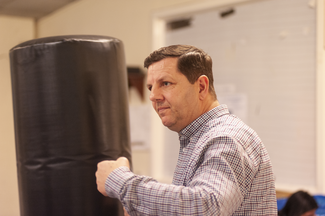‘Ghost Gypsy’
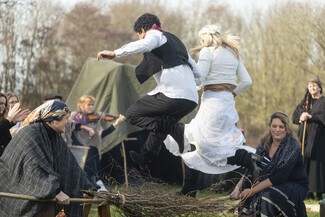
The making of the film ‘Ghost Gypsy’, by writer and director Sharon Muiruri Coyne
“The project was exciting. In a way it feels like you are getting something off your chest because you can be yourself and no one is there to judge you.” (Young Traveller St. Aldhelm's)
A community film about a young Traveller girl ‘Violet’ searching to find her way in the world: on her quest to find ‘her true self’.
I was approached to work on this project because as an applied drama practitioner my work is to engage with people and support them in telling their stories through drama. Before you can begin to create anything there has to be a level of trust and dialogue between you, as the facilitator, and the group you are working with.
The brief was to create a series of workshops with the Traveller community around encouraging young women to exercise their vote. It was a creative initiative from The Arts Development Company, funded by ‘The Women’s Vote Centenary Grant Scheme’, in partnership with DREC (Dorset Race Equality Council), DEED (Development Education in East Dorset) and the Gypsy Roma Traveller (GRT) community group Kushti Bok.
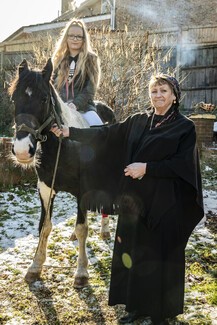
Alongside me was Jane Jones from DREC who had the task of making the initial contact with the community in various settings. This was a very difficult task, as some people did not want to be identified as Traveller or Gypsy. This is not surprising given all the prejudice that this particular ethnic group has had to endure over hundreds of years and sadly still does endure to this day. However, bit-by-bit lines of communication began to open.
Many different strategies were devised to entice the community in, but it was not until the idea of making a film was introduced that there was a wave of real interest. I think this is because of the strong traditional links between Travellers and storytelling. It was also a suitable method because the various groups we were working with were living in different places – we had one wonderful family who were keen to take part in the project but then had to move off site suddenly. Therefore, the film would be a good way of capturing people’s stories.
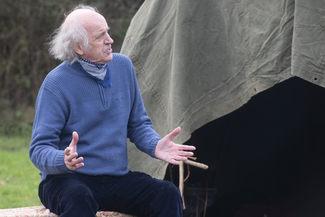
Jane and I did our own bit of travelling for the project; driving around the countryside. On our journey we were fortunate to meet Ray Wills ‘The Gypsy Poet’ he could equally be called ‘The Gypsy Folk Historian’; he has collected and researched a wealth of material on Travellers’ history, particularly in Dorset. He has written several books on the subject.
Jane said one person I had to meet was Betty Billington, Chair of Kushti Bok. Betty really is the linchpin for the Traveller community in the area. I had a wonderful meeting with her and her daughter Karen Packman. Betty, like Ray, is a fountain of knowledge. As an adopted person who is unsure of my roots, I found the detailed genealogy of this particular community fascinating. Betty is the proud granddaughter of the first flower seller in Bournemouth: Betsy Smith. So, after talking to her I knew our film needed a scene to celebrate the flower sellers.
Jane took me to various sites. It was a privilege to be invited into people’s trailers. One lady told us of how she was discriminated against in all sorts of ways; some quite subtle and others with devastating consequences: for example, affecting her children’s schooling.. She couldn’t read but she was an intelligent and articulate woman. One teenager told us how she had been teased because the school bus stopped outside of their council site. Another young mum related how her ‘Granfer’ had lost his land because he couldn't read or write and was tricked into making his mark on the documents expropriating his land. One person recounted how an arts project had come and filmed them and they never heard from them again: hence their suspicion of us wanting to make a film. As a practitioner that kind of behaviour, in my opinion, is the theft of people’s stories. We were determined that everyone would be named in the film and have a copy of the film and photographs. I also shared the script as I was writing it .We had a series of reading and consultation sessions where participants were able to help me with the language: for example the young people at St. Aldhelm’s Academy (formally Kemp-Welch School) were very happy to tell me that you don’t use the word ‘police’ you use the word ‘gavers’. Betty and others enjoyed thinking of names for the characters, such as “Violet’ and ‘Caleb’. She was also able to correct a few facts in the play: I had thought that Gypsies were not on the 1911 census but they were – many made their marks. In this way I was able to amend this fact in the script.
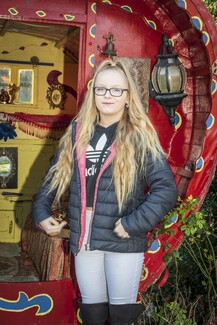
A facilitator can be useful in having an outside view to interpret stories into a creative form. Alongside the collection of oral histories, I read about the history of Travellers and watched documentaries: in particular about the shocking incident at Dale Farm. In writing the script I tried to distil the history of Gypsies and Travellers; honour people’s stories and focus on young women and voting: all within a short film. This is why I selected the frame of time-travelling. Through young ‘Violet’ (Shannon Mahoney) travelling back in time and meeting with the ghost of her granny (Betty Billington), I was able to introduce some of the challenges that Travellers have faced through history. I also included the suffragette’s scene to show how people can protest peacefully and show inter-community solidarity
The heart of the project was a drama group consisting of five young Traveller girls at St. Aldhelm's Academy, Poole. This school has a significant Traveller population: predominantly in housing, due to large Gypsy history of Rossmore close by. St. Aldhelm's Academy was extremely supportive and saw this as a real opportunity for their young people and to highlight the rich heritage of Travellers.
“I surprised myself doing the film. I never really do anything like this because I get way too nervous, but I did this because I’m interested. Doing the film has made me feel better about my culture: I don’t have to worry about what other people say.” (Young Traveller St. Aldhelm's)
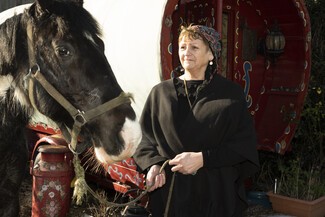
When I first asked the girls if they would like to be involved, they were suspicious; “I don't know about it. I don't like people knowing I’m a Traveller”. However, as soon as we started meeting together there was a sense of relief from the girls: they understood each other and were able to relax. Over time they became a committed group staying behind after school on Fridays and filming over the weekends. This is significant, given that some of the girls struggle with school attendance. On my first meeting with them, one of the girls said ‘people say you’re not a real Gypsy if you don’t live in a caravan’. This statement struck me because of the dilemma young Travellers face knowing that they are Gypsies, but not being able to live in the way they would like. They are betwixt and between two worlds. This became a key theme of the project. How do you navigate being a young woman and a Traveller in the 21st century? The group didn’t know much about their roots, so the project became a cultural learning process. The making of the film became a living history lesson. Betty and Karen from Kushti Bok joined the after-school group on several occasions. This was an important element of the project.
“I learnt a lot about my culture and how we used to be. It was nice meeting Karen and Betty because they live it and understand how it is at school. It was important having them because they are Travellers and they are on the same page as us.” (Young Traveller St. Aldhelm's)
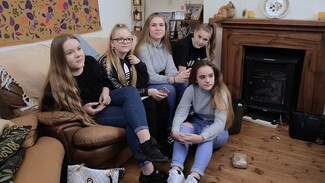
After the project was over, I was running a workshop with another group and someone asked me about the Holocaust: “How come people were so mean to the Jews?” One of the girls from the project said “It wasn't just Jewish people: Gypsies were also were also persecuted.” This knowledge was a direct result of taking part of in the film.
Making the film was not an easy process: We were working to a tight deadline on a shoestring budget and with non-actors. However, the film gave us focus and brought people together, so that all the shoots turned into community gatherings. People really enjoyed talking together and there was a very positive spirit at these events. At Susan and Caleb Johnson’s home, they uncovered their wagon so we could use it for the suffragette scene. Their son Michael made a fire then Caleb came out on that snowy morning and played his accordion and sang ‘Danny Boy’. Susan told me she was born in a Vardo and Caleb in a bender tent. There was genuine excitement about making something happen on this housing estate near Parkstone and of course when the horse ‘Elvis ‘ arrived that was the icing on the cake.
Ray Wills suggested Millhams Mead, Kinson would be an ideal site for capturing the Gypsy Wedding Scene as it had such a deep connection with Romany history, with St. Andrew’s Church being a well-known Gypsy Church. He was right: there was a timeless beauty there that evoked the past. Rev’d Jonathan Herbert (Church of England Chaplain; Gypsies &Travellers Dorset & Wiltshire) made a bender tent and took the role of the Priest in the film.
“It was nice doing outdoor bits at Kinson: everyone came together and it felt natural. Where we are… where we live …our house it’s near the road. It’s not how we want to live! The caravan is our sleeping place: outside is our home”. (Young Traveller St. Aldhelm's)
The non-contact boxing club ‘Life Changing Choices’, a wonderful initiative by Michael Johnson, that really helps support young people in the area, became a centre for meetings and a place for filming.
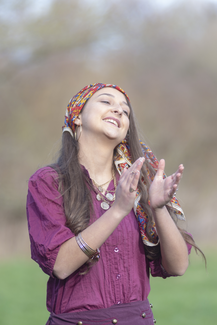
We also filmed in Bournemouth gardens for the flower girls scene.
A turning point came for me, as facilitator, when someone could not make it to the filming after committing to do so. The problem was then that a film crew had been assembled for a particular date and so we had to go ahead with filming for that day. At this point my suggestion was to bring in an actor to take on the role. Kushti Bok were adamant that we had to work only with Gypsies and Travellers for Gypsy and Traveller roles. I was truly sympathetic, but we also had to make the filming happen that day. Thankfully, Michael Johnson heroically stepped in and took on the missing role. Of course he didn't know the lines, so the filming was slowed down and the piece was hard to edit, but I have to say that it was the right course of action. I can see how important this was because in so many cases Travellers have been portrayed by outsiders to the community.
What happened is a ‘film community’ grew and people stepped up. Kushti Bok also came to understand the difficulties of trying to make a film and going through these challenges brought us together. Kushti Bok understood that they were listened to and that we took their path. This helped to create a strong working bond. The desire to encourage Travellers to take part also gave real ownership to the community and drew people into the project.
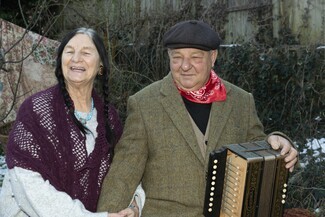
We are hoping that the film will go some way towards challenging people’s stereotypes of Travellers. As Shannon (who played Violet) said: ‘At school they don’t teach about my culture because no one knows- but the film can teach others.’
Betty’s comments on the whole project says it all: "I never realised that having fun was such hard work, but I loved every minute and I’m proud to have been a part of something that may go some way to combat bullying and discrimination of Britain’s largest ethnic minority group: Gypsies, Travellers and Roma".
Extract from the Ghost Gypsy Eviction Scene: Activist Bernadette: We will stand together. This is the last trailer! You have bulldozed all the rest. You have destroyed the path to this trailer. But we will not go quietly. We have Human Rights. We have a culture. We have a voice. We want a peaceful life. We want our freedom back.
Post Script:
A community project supported by the Arts Development Company, Dorset, Sarah James (Arts Development Company), Jane Jones & Nathalie Sherring (Dorset Race Equality Council), Louise Boston-Mammah (DEED) and Kushti Bok ;Betty Billington & Life Changing Choices; Michael Johnson.
Filmed by Hands on Media Jordi Robert and edited by Martin Coyne.
Written & Directed by Sharon Muiruri Coyne.
Photographers: Richard Jeffery and Owen Tuckett.
Folk Historian: Ray Wills. Ray Wills Books: ‘Where the River Bends’ & ‘The Canford Chronicles’ are available from Lulu.com
All Gypsy and Traveller roles are played by volunteer Gypsies and Travellers so the film is authentic!
Non-Traveller roles were played by wonderful volunteers from other community drama projects that I have been involved with: Vita Nova (a community theatre group for people in recovery from drug and alcohol abuse) and The Pilsdon Community.
Article by Sharon Muiruri Coyne-Actor Facilitator Writer Associate Fellow of Winchester University
(Lead photograph: ‘The Gypsy wedding’ from Ghost Gypsy. Taken by Richard Jeffery)
